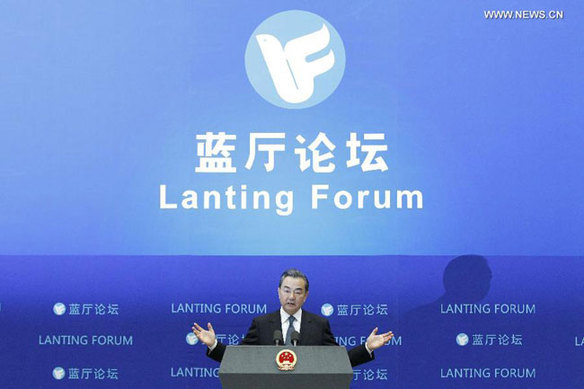
APEC Beijing: China is ready
China.org.cn, November 3, 2014
-

Chinese Foreign Minister Wang Yi speaks at the 10th Lanting Forum in Beijing, Oct. 29, 2014.[Photo: Xinhua/Xing Guangli]
The Asia-Pacific Economic Cooperation will officially open the 22nd APEC Economic Leaders' Meeting in Beijing on Nov 10. Chinese President Xi Jinping and leaders and representatives of the other APEC members will meet in Beijing to discuss the future of APEC and the overall development of the Asia-Pacific region.
This year marks the 25th anniversary of APEC. Twenty-five years ago, 12 economies in the Asia-Pacific jointly announced the inception of APEC. The birth of this new body generated relatively little attention compared with the defining events of the year: the collapse of the Berlin Wall or the end of the Cold War. Yet in the years that have followed, APEC has grown from strength to strength and taken on increasing influence. Today, APEC has evolved into one of the world's premium regional dialogue and cooperation mechanisms, and has a significant and far-reaching relevance to the economic landscape of the Asia-Pacific and beyond.
The world is undergoing a new round of turmoil and instability. Hotspot issues keep emerging and a global economic recovery remains a daunting task. The Asia-Pacific, compared with other regions, has enjoyed overall stability and robust economic growth, serving as an anchor of world stability and a foundation of global prosperity, China has played its due important role in this process. It is fair to say that the world has great expectations for the Asia-Pacific, and China in particular.
As an important member of the Asia-Pacific family, China has always taken the responsibility to promote Asia-Pacific prosperity and stability and has played a constructive role in regional affairs. The Communist Party of China leadership, with Xi Jinping as general secretary, is building on the fine traditions and the diplomatic guidelines and policies of New China, and making even greater initiatives in creating a favorable external environment for realizing the Chinese Dream of the great renewal of the Chinese nation. Greater efforts have been made to ensure that China's development and the development of the world are mutually reinforcing, and that China continues to play an even greater role in regional and international affairs as a major responsible country. That is a main feature of China's diplomacy in the new era and a fundamental direction of its policy toward the Asia-Pacific.